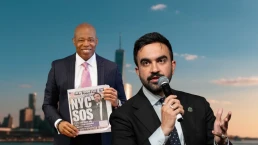The National Labor Relations Board makes sure employers follow the rules when workers organize, but its resources are stretched too thin.
by Tom Conway, OtherWords
Last year, lid manufacturer Tecnocap illegally slashed health benefits for workers at its Glen Dale, West Virginia plant.
Workers began delaying doctor’s appointments. Others were forced to delve deeply into their pockets — one even put thousands of dollars of chemotherapy charges on credit cards to save his wife’s life.
Lisa Wilds, president of United Steelworkers Local 152M, assured her colleagues that the company would be held accountable. And it was. This past August, the National Labor Relations Board (NLRB) ordered Tecnocap to reinstate the old health plan and reimburse workers, with interest, for all expenses they incurred.

When employers like Tecnocap break the law, workers rely on the NLRB to enforce their rights. But a funding crisis imperils that mission at a time more and more Americans need the agency’s protection.
The NLRB hasn’t gotten a budget increase since 2014, even though its workload skyrocketed in the wake of the pandemic. Union drives, overseen by the NLRB, increased 53 percent this year as workers banded together for higher wages, affordable health care, and paid sick leave.
Along the way, the NLRB stepped in to save the jobs of workers illegally fired for union activity, force companies to bargain in good faith, and prohibit employers from spying on and demeaning workers. “There is no way to put into words the value and importance of the NLRB,” explained Wilds, who stands to recoup about $7,000 in medical expenses.
Recent Posts
Mayor Mamdani’s First Day, A Zero Hour Conversation With Richard Wolff
July 2, 2025
Take Action Now If elected, what would Mayor Mamdani do on his first day in City Hall? How would a democratic socialist govern as a big-city mayor?……
The U.S. Is Funding A Bloodbath At Gaza Aid Centers
July 2, 2025
Take Action Now The admin just gave $30M to GHF, the organization at the center of charges that Israel is weaponizing assistance and shooting at…
Feeding The Warfare State
July 1, 2025
Take Action Now We Lose, the Weapons Makers WinBy William D. Hartung, Tom Dispatch The Senate is on the verge of passing the distinctly misnamed…
The Rage Of Billionaires And The Frenzy To Stop Zohran Mamdani From Becoming New York’s Mayor
June 30, 2025
Take Action Now The constellation of forces now regrouping with a vengeance includes titans of Wall Street, enormous real estate interests,…




